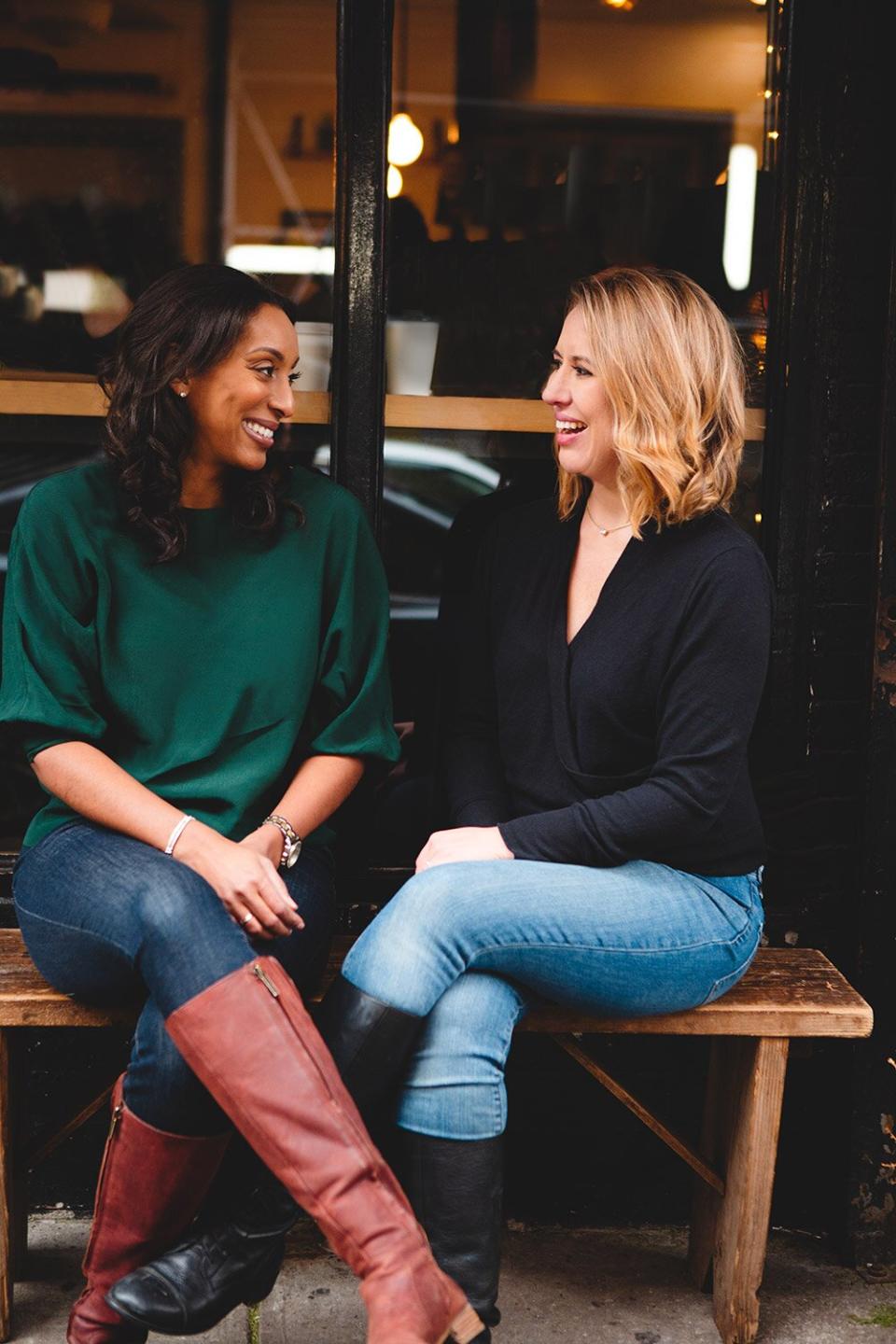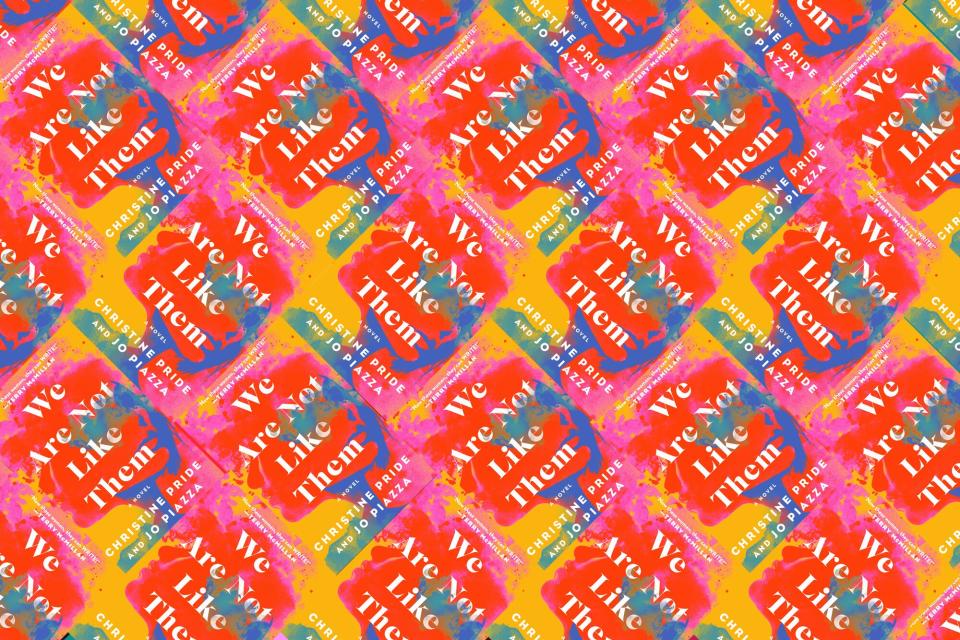The Conversation: Christine Pride and Jo Piazza wrote the interracial friendship they wanted to read
- Oops!Something went wrong.Please try again later.
- Oops!Something went wrong.Please try again later.
Christine Pride and Jo Piazza are publishing industry veterans — the former is a longtime editor at Simon & Schuster, the latter is a best-selling author — but this year they set off into a wholly new frontier: co-writing a novel. The result of their collaboration is one of the fall's most anticipated titles, a buzzy novel that's been making waves in book circles for months.
We Are Not Like Them (out Oct. 5) is a dual-narrator story following two childhood best friends who grew up together in Philadelphia. Jen, who is white, married a police officer and is entrenched in the PPD inner circle. Riley, who is Black, is a newscaster returning to her hometown for a big new gig. Soon after Riley moves back, a deadly police shooting of a Black boy becomes her first big on-camera story — and Jen's husband is involved.
Pride and Piazza simultaneously navigate the ripped-from-the-headlines tragedy and the effect it has on Jen and Riley as their friendship is tested by their views. Here, the authors discuss why they decided to create this urgent work, how they kept Jen from being a Karen, and the secrets to a true literary friendship.

Julia Discenza Christine Pride and Jo Piazza
ENTERTAINMENT WEEKLY: This is your first time as co-authors, but it's not your first time working together on a book. How has your professional relationship evolved to this point?
JO PIAZZA: Christine was my editor on my last novel, Charlotte Walsh Likes to Win, and we hit it off from the very beginning. It was a very unique writer-editor relationship; we really helped develop that book's story line together. I was pregnant and actually turned in the manuscript while I was in labor, and then we did our first round of revisions with me breastfeeding my 4-week-old and Christine typing the edits in for me. Then we went on book tour together, which is unique, but it helped our friendship blossom. We started talking about how we had never seen a true-to-life, authentic interracial friendship on the page.
CHRISTINE PRIDE: As an editor, you're always looking for new and different ways to tell stories, and I had never seen this approach in a big commercial way where a Black woman and a white woman write together. Police shootings had been in the headlines more and more, and it was very much on my mind. It felt like a galvanizing premise, to see how a friendship might be tested or changed by current events. We knew that writing this book individually wouldn't be nearly as strong as if we wrote it together. I really liked working behind the scenes and coaching writers, and I never wanted the limelight — this all kind of happened on a lark. But once we started the process, the momentum built. A thousand things had to fall into place for this book to exist.
PIAZZA: We are forgetting one part of our origin story, which is that Christine and I had gotten a contract at Simon & Schuster to write all of the Younger books. We banged that out in like four weeks; I'd write it and Christine would really get her hands dirty with the editing, and that showed us how well we could work together on a similar project. We were texting each other dirty, sexy things at, like, Christmas dinner with my mother-in-law. [Laughs]
Did one of the characters come to you first, or did you develop Jen and Riley simultaneously? And what was important to you in their development?
PRIDE: The characters really came about simultaneously, because we knew we wanted a Black woman and a white woman who were friends, and that we wanted each chapter to alternate between their two viewpoints. Interracial friendships are rare, and we knew we wanted these women to be lifelong friends — we spent a lot of time thinking about what brought them together and how they sustained their relationship over time.
PIAZZA: We also decided pretty quickly to place the story in Philadelphia. It's a big city that is still fairly racially diverse, and it would give the opportunity for these two women to grow up a few blocks apart — as opposed to a lot of big cities that are more segregated. I grew up in the suburbs of Philly, and I recently moved home from living in San Francisco and New York for a long time, and I just love it. I think it's the greatest city in America and deserves to be portrayed the way New York is constantly portrayed in novels. But also Philadelphia is a city that has a lot of reckoning to do when it comes to race. We tried to bring those things into the book.
PRIDE: One of the things we struggled with in writing Jen's character is that she has a lifelong Black friend, so she can't be completely naive to racial issues. But she had to be naive for some friction to grow in their friendship. And she still had to be sympathetic: She doesn't always say everything right, but she isn't a Karen or a caricature of that.

Atria Books 'We Are Not Like Them,' by Christine Pride and Jo Piazza
How did you get into the heads of these women, especially Jen with her perspective on policing that I suspect leans a bit more pro-police than the two of you?
PIAZZA: I've been a journalist for 20 years now, so I approach everything like that and it leads me to do a lot of interviews, even for fiction. We interviewed cops, mothers of shooting victims, newscasters — since Riley is a newscaster. We just listened to these other voices, and also to each other, as much as we could.
Did anything about those interviews surprise you?
PRIDE: A blind spot for us, frankly, was the world of policing. I'll speak for myself, but I was surprised in talking to judges, lawyers, police officers, by a lot of the ways in which the system works. How insular the policing community is. It can be positive, insofar as police officer's and their spouses have each other's back and they're very loyal. In a weird way it reminded me of publishing, in the sense that it can be insular and it's easy to have a feedback loop.
PIAZZA: I think the easy route would have been to just be like, "The police are bad. The police officer is the villain, he is the worst." But we wanted to show the nuance in everything, including the policing. The ending was the biggest struggle we had. We turned in our draft before George Floyd was murdered, and we sold it two or three years before that. In our original ending we didn't have many consequences for the officers involved, because that mirrored reality. But we worried we were going to disappoint people who were looking for consequences. So writing the ending we did and trying to make it authentic but also satisfying in terms of justice was hard.
You realize in reading this book and knowing the stories of people who have been victims of police violence that the real justice is impossible because it would be bringing their loved ones back…
PIAZZA: One of my very good friends is the head of policing at Penn, and she was one of the first female cops in Philadelphia in the '70s. We've been friends since I was a crime reporter in Yukon. I've seen her have so much empathy, and we wanted that to come across on the page — but there's also a lot of huge systemic problems. Again, it's so many shades of gray. It would be easy to make this a morality tale and to fall into a trap of our own agenda. We knew that the book would not work if we came across like we had an agenda.
One way we tried to prevent that was to keep bringing the story back to Jen and Riley's friendship. Everything needed to be grounded in how these women relate to one another.
PRIDE: So often books about race focus on Black pathology, on the trauma porn of the so-called Black experience. You know, the broken homes, growing up without certain things. As a Black woman, I felt strongly that this character of Riley would not fall into those tropes. She can be from a happy, stable, middle-class home and have a nice life. The way Riley and Jen relate to each other is that Jen takes solace in Riley's house — that was her safe place growing up. It's not a Black character being saved by a nice white family, there's no Sandra Bullock character here.
Jen and Riley become friends as children, when they are more color-blind and not aware of the ways their race affects each of their lives differently. What did you want to show in their each coming to that realization?
PRIDE: It would have been a very different story if they had become friends as adults with the knowledge of what an interracial friendship means. We made the choice that they didn't live in the same city for a lot of their adult lives. Riley went off to college and stayed away, and so whenever they reunite they're presented with the ways they have changed. And then right away when Riley moves back this explosive thing happens [in the police shooting], and they have to do a different kind of reckoning.
PIAZZA: The friends you make early on are grandfathered in, and you often wouldn't choose them if you met them in the current day.
Did you feel pressure to make every element of the book reflect the changing narrative and political landscape around policing and racial justice?
PRIDE: The book is set in 2019, which is important because the world is just on the cusp of the revolution that happened after George Floyd. Putting on my editors' hat for a second, I always tell my writers that you can't chase what's happening in the world. It's just impossible. But in this case, what happened in 2020 was such a pivotal historical moment that we did want to make the ending reflect the new world a bit. We were in the place in the production cycle that we still had time to do it, and what we rewrote was more in the zeitgeist; if we hadn't, the conversation about the book would have been just about, oh nothing happened to Kevin [the police officer], and it would have taken away from the other nuance we want people to see.
What will you do, together, to celebrate publication day?
PIAZZA: We haven't talked about this yet, but we need to figure it out. But we can tell you what we have done already, when we sold the book: We went to this pizza place in Harlem and we had tequila shots and became best friends with the bartender.
Related content:

